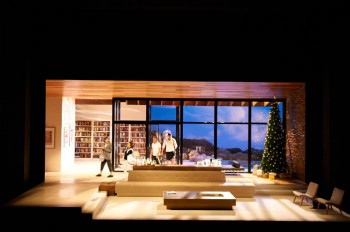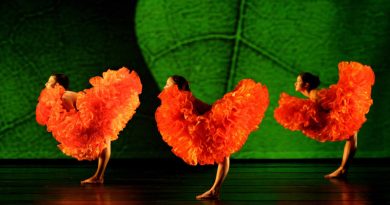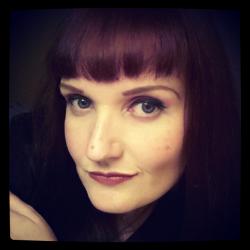Other Desert Cities by Jon Robin Baitz – Black Swan and Queensland Theatre
The events that occurred in America on September 11, 2001 still continue to create ripple effects around the world, more than a decade later.

As an American who was living in the US at the time of the attacks, as well as the time that this play is set (2004), it’s interesting to see what Australians make of this particular era in the American psyche via this particular play. The company has managed to produce a facsimile of a family that could exist in the States, but it is only an impression. The piece rings hollow as an empty shell; it lacks a beating heart at its centre.
Once again, the set and lighting are exquisite, especially Trent Suidgeest’s sunrises, sunsets and reflected water effects. All things considered, the set design by Christina Smith does a good job of mitigating the vast space of the stage in order to facilitate the intimacy required by the story. By constructing a realistic desert dwelling that reflects this family’s privilege in its expansive elegance, while also bringing the playing space onto the apron and as close to the audience as possible, we sense a contrast between this family’s expectations and its needs. Some of this productions more gorgeous moments were to be found not in the dialogue, but in these low-key, atmospheric transitions between scenes, where sound designer Tony Brumpton’s cool soundtrack worked in perfect conjunction with Suidgeest’s painted desert lights, as the family went about their business.
Ultimately this drama fails to connect. The actors are trying very hard to convince us that something important and fascinating is going on, but when the time comes to drop the play’s bomb, it lands with a dull thud. The set-up is long, and the crackling tension that should be there to propel the action forward is missing. It was difficult to place sympathy with anyone but Trip (Conrad Coleby) and Silda (Vivienne Garrett), who drifted around the periphery of this story, offering a bit of relief from the grandiose lamentations from mother and daughter. Lyman (Robert Coleby) is stuck in the middle, a hollow man, with nothing to offer either side of the debate or the drama.
The conflict between mother and daughter seems superficial; we know they’re at each other’s throats, but that appears to be the extent of the struggle. Neither one ever falters in her stance, or lets us think that either will change her mind, or be won over, so that parallelism tends to exclude those moments of “will they or won’t they?” that are fundamental to keeping the audience hooked. Brooke (Rebecca Davis) was so physically tense the whole time that it was difficult to want to watch her; this was a character choice that kept her closed off from my sympathies. Polly (Janet Andrewartha) was fearsome and droll, but I’m not sure that these qualities weren’t just a garment Andrewartha donned when appropriate to the text and the staging.
I will say that Kate Cherry has assembled a cast that very much looks like a family. I suppose it helps when she employs real life parents and offspring (Robert and Conrad Coleby), as she did with her recent production of The Importance of Being Earnest. However, while Other Desert Cities may have been a recent hit on Broadway, it lands slightly off the mark here in Perth.



Spoiler Alert!
Cicely, first I’d like to say that I have nothing to do with this production. But I’m afraid you’ve fundamentally misunderstood this play and its characters. This is a microcosm of the political divide in America. No one was ever going to change position because their fundamental beliefs and ethics are at stake. The parents’ whole world view is diametrically opposed to the daughter, and they each have lived their lives by these principles. It is anything but superficial: it represents the battle between left and right in 21st Century America. Never have things seemed as intractable as they are now, and the relationships reflect that. Polly indeed was fearsome and droll, and the fact that you think this was down to text and staging means she was even more convincing. This is what powerful, prominent families do: it is all facade, it is a controlled image at all times, a sense of power and dignity must be maintained no matter what the reality. If Brooke was tense all the time it’s that she believes she’s seen through this facade, seen the empty shell beneath and has had to live with it and deal with it hew whole life. Now she is there to expose it, to betray her family and destroy their legacy to give her brother redemption, in spite of her love for her father. Even discounting the previous breakdown, is this not worth extreme anxiety?
Lyman is not a hollow man at all. He is trying to be diplomatic to save his family, protect his daughter, give her a better life, even though he doesn’t agree with her decisions. He restrains himself not because he is weak, but because if he doesn’t he will drive her away forever. He is a diplomat in work and in life. He represents a possible compromise, which is in reality the only way forward in the world. Trip is in fact the hollow man; has merely given up on having an opinion so he can live a narcissistic and facile life in reality TV. He doesn’t stand for anything and won’t fight for anything.
The ending brought all these threads together. In the final scene Brooke betrays values that she has lived her whole life by for the sole purpose of protecting the family, and in fact takes it a step further and mythogizes the legend even further. She has become her parents. This is an intricate and informed study of the psychology of each side. It is also a fascinating example of how our memories are not fact real, but are mere fragments of events molded and twisted by our experiences. I’d suggest you read The Righteous mind by Jonathon Haidt. It gives a remarkable insight into the issues, ethics and psychology this play raises.